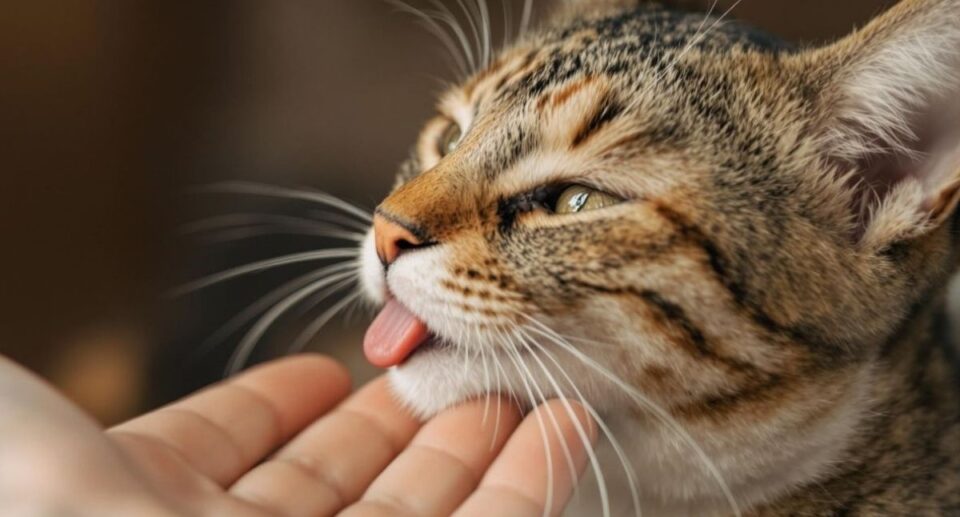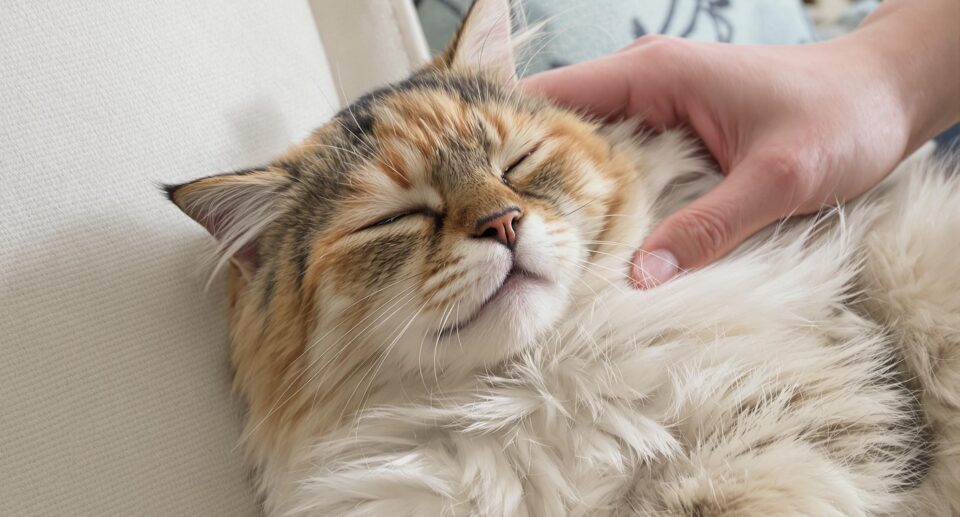
Key Takeaways
- Cat licking can mean affection, curiosity, stress relief, or a simple request for attention.
- Occasional licking is normal, but excessive or obsessive licking may signal stress or a health concern.
- Paying attention to when and why your cat licks you can help you respond in a way that keeps them happy and healthy.
If your cat gives you the occasional lick, it’s not just a quirky habit—it’s part of how they interact with you. Licking can mean many things depending on the context, including affection, stress, or even just curiosity. It’s one of the ways cats express themselves without using a single meow.
At PetHealthMD, we’re here to help you make sense of your cat’s behavior so you know what’s worth noticing. Whether licking is part of their routine or something new, we’ll walk you through the reasons behind it—and when it might be time to pay closer attention.
Understanding Cat Licking Behavior
Your cat’s licks might catch you off guard, but they’re often trying to tell you something. Licking can mean a lot of different things, depending on your cat’s mood or what’s going on around them. Let’s take a closer look at what your cat might be saying when they give you a lick.
Licking as a Sign of Affection
One of the most common reasons cats lick their owners is to show affection. In the wild and multi-cat homes, cats often groom each other as a way to bond—this is known as allogrooming. When your cat licks you, they may be treating you like part of their trusted social circle. You might notice this happens when they’re already relaxed, often paired with purring or curling up next to you.
Requesting Attention or Interaction
Licking can also be your cat’s way of getting your attention. They might be looking for a little extra petting, food, or playtime. If the licking is followed by pawing, meowing, or rubbing against you, they’re probably hoping you’ll engage with them.
Marking You with Their Scent
Cats have scent glands in many places, including their tongues. When your cat licks you, they may be leaving behind their scent as a way to mark you as part of their territory. This behavior helps them feel secure and connected to you, almost like claiming you as one of their own. It’s a subtle but meaningful sign that your cat feels at home with you.
Tasting Something Interesting on Your Skin
Sometimes, licking is about curiosity, too. Your skin may carry the scent or taste of food, lotion, or even sweat, which can catch your cat’s attention. Some cats are especially drawn to the salty flavor of human skin. These curious licks are usually quick and don’t necessarily mean your cat is trying to bond.
Self-Soothing or Stress Relief
Licking can also be a way for your cat to calm themselves when they’re feeling anxious or unsettled. Some cats turn to licking their humans more often during times of change, like moving to a new home or after a disruption in their routine.

How to Respond When a Cat Licks You
Not every cat lick needs a big reaction, but how you respond can shape your cat’s behavior over time. Here are a few ways to respond in a way that supports healthy interaction:
- Stay calm and still: If the licking is gentle and brief, there’s no need to interrupt. It may just be your cat’s way of showing affection.
- Give gentle affection back: Light petting or soft talking can reinforce licking as a calm, bonding behavior. If your cat purrs or stays close, they’re probably enjoying the moment.
- Redirect if it’s too much: If the licking becomes persistent or overwhelming, offer a toy or treat to shift their focus. This teaches them there are other ways to get your attention.
- Avoid punishment or scolding: Reacting harshly can confuse your cat, especially if the licking is driven by stress or affection. Gentle redirection is more effective and less stressful for both of you.
How you respond to licking can either encourage a positive connection or gently set limits when needed. The goal is to create a calm, trusting relationship where your cat feels secure.
When Cat Licking Becomes a Concern
Most of the time, your cat’s licking is nothing to worry about—but there are moments when it’s worth a second look. If your cat starts licking you constantly, won’t stop licking one spot on their own body, or seems restless while doing it, they might be trying to cope with stress or discomfort. This kind of licking can sometimes turn into a habit, especially if they’re bored, anxious, or dealing with skin irritation like a hot spot.
It’s a good idea to pay attention to when and how often it happens. If the licking feels excessive, is paired with other changes like hiding or over-grooming, or seems out of character for your cat, it might be time to check in with your vet. They can help you figure out what’s behind the behavior and suggest ways to help your cat feel more comfortable.
Frequently Asked Questions About Cat Licking
Is it normal for cats to lick their owners?
Yes, it’s perfectly normal. Licking is one of the ways cats show affection and trust, much like they do when grooming other cats they’re close to.
Why does my cat lick me and then bite me?
This is often part of playful behavior or a sign that they’re done with interaction. Pay attention to their body language, though, as twitching tails or flattened ears usually mean they’ve had enough.
Should I let my cat lick me?
It’s generally safe to let your cat lick you if you’re comfortable with it. However, if you’ve applied lotion, medications, or other products on your skin, it’s a good idea to redirect them gently.
Why does my cat lick my hair or face?
This is their version of social grooming, which is a bonding behavior between cats. It’s usually a sweet sign that your cat feels close to you and sees you as part of their trusted group.
Licking Is Part of How Cats Communicate with You
Whether it’s a single lick or a full-on grooming session, cats use licking to communicate in ways that often go beyond words. Understanding why they do it can help you respond in a way that makes them feel safe and connected to you.
At PetHealthMD, we believe the small moments with your pet matter just as much as the big ones. That’s why we’re here with tips to help you understand your cat’s behaviors and build a stronger bond every day.





